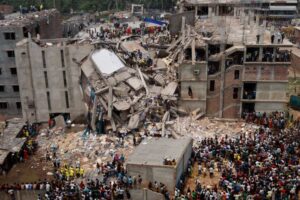Savar Upazila, Bangladesh- In 2013 of this week, the Rana Plaza factory complex in Bangladesh collapsed, killing more than 1,100 garment workers, primarily young women, and injuring 2,500 others. 
It was the largest industrial accident since 1984, when a gas leak at a factory in Bhopal, India, killed more than 3,500 people and exposed thousands more to toxic fumes.
Images of the Rana Plaza collapse caught the world’s attention and became a catalyst for corporate action on factory safety.
This led over 220 international brands to sign the Accord on Fire and Building Safety in Bangladesh, a unique binding agreement that set up a monitoring and remediation system in the factories where the mostly European brands sourced from. Other brands, primarily from North America, joined the Alliance for Bangladesh Worker Safety.
Today, more of those buyers recognize that factory safety is important and that they will be held to account, and are being more transparent about publicly listing where they source their products.
Factories covered by the Accord and the Alliance are safer in part because they underwent a series of inspections, had plans to fix the problems identified, and those that didn’t comply were not allowed to work with member companies.
During those inspections, a litany of problems were identified. These included structural flaws, blocked fire exits, and a lack of fire doors and proper fire alarm and sprinkler systems. About 84 percent of those problems at Accord factories have been addressed, and 90 percent of issues at Alliance factories have been remediated. The Accord terminated 96 of its roughly 800 suppliers, and the Alliance 168 of its roughly 2,000. Millions of workers have been trained on safety procedures and safety committees have been formed at many factories.
We do our part in furthering training, education, and prevention of such tragedies.
Read more from original source.
We are here to help you.